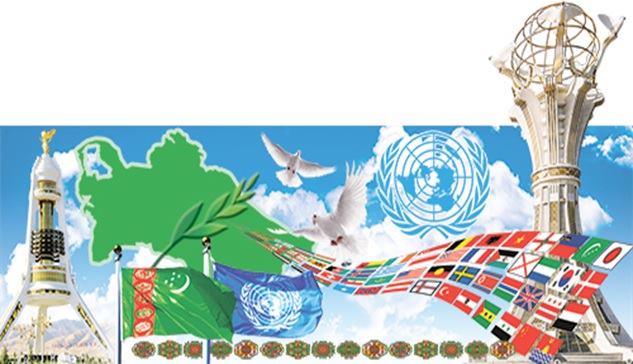After independence, Turkmenistan chose a foreign policy aimed at good-neighbourly relations, peace, mutually beneficial cooperation and humanism. On December 12, 1995, Turkmenistan received the unanimous support of 185 UN member countries with the adoption of the UN General Assembly Resolution on the “Permanent Neutrality of Turkmenistan.”
Neutrality has become the basic foundation of the country’s foreign policy, the policy of peace, friendship and cooperation.
At international law, neutrality is defined as the legal status, which recognizes the state’s obligation to refrain from any kind of war as well as from joining any military alliances and blocs that may involve in military clashes, except the state’s self-defence against armed attack.
The first intentions to carry out the neutral foreign policy were announced at the meeting of the Conference for Security and Cooperation in Europe held in Helsinki on July 10, 1992. To achieve the legal status of neutrality, the government of Turkmenistan conducted effective negotiations with a range of foreign countries and leading international organizations. In addition, the necessary legislative work for the legal status of neutrality was carried out at the national level. On March 16, 1995, the Parliament of Turkmenistan adopted a decree “On the approval of the policy of permanent positive neutrality of Turkmenistan.” In this regard, the meeting of the Organization of Economic Cooperation held in March in 1995 supported the initiative of Turkmenistan on the status of permanent neutrality. Then the proposal was unanimously supported by the Non-Aligned Movement.
At the 50th jubilee, session of the UN General Assembly held in 1995 a special resolution no. 50/80A on the “Permanent Neutrality of Turkmenistan” was adopted with the unanimous support of UN member states. This historic resolution calls the member states of the United Nations to respect and support this status of Turkmenistan and to respect its independence, sovereignty and territorial integrity.
The neutrality of Turkmenistan is:
by origin – recognized. The UN General Assembly adopted resolutions on the permanent neutrality of Turkmenistan on December 12, 1995 and on June 3, 2015;
by nature – permanent, i.e. it is not limited by time, it is in effect both in war time and peace time;
by content – positive. This means that the state shall have an active approach in order to maintain peace and stability and to develop friendly relations and cooperation among states.
Our country, steadily following the principles of the legal status of permanent neutrality, responsibly fulfils its international obligations. This can be exemplified by negotiations for the peaceful settlement of the inter-Tajik conflicts as well as the restoration of peace in neighbouring Afghanistan. Another confirmation of the essential peacekeeping role of the Turkmen neutrality in the region is the opening of the UN Regional Centre for Preventive Diplomacy for Central Asia in Ashgabat in 2007.
The “Foreign Policy Concept of Turkmenistan for 2013-2017” states that Turkmenistan’s foreign policy will be based on the legal status of neutrality and recognizes the United Nations as its main strategic partner. Another resolution of the UN General Assembly “On Turkmenistan’s permanent neutrality” was adopted at the 69th session on June 3, 2015. 47 states are the co-authors of the document. The resolution supports the government’s decisions to declare 2015 as the Year of Neutrality and Peace in the country.
Turkmenistan’s foreign policy is based on the complete coincidence of long-term goals of our country and international organizations in the context of strong mechanisms for maintaining peace and security in the region.
.
Nurmuhammet CHARYYEV,
1st year student of the Faculty of International Journalism
of the Institute of International Relations
of the Ministry of Foreign Affairs of Turkmenistan.





Comments